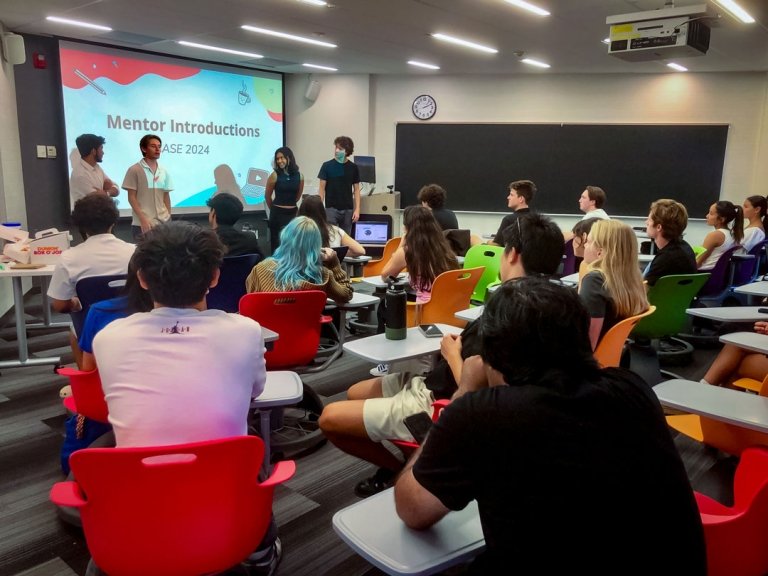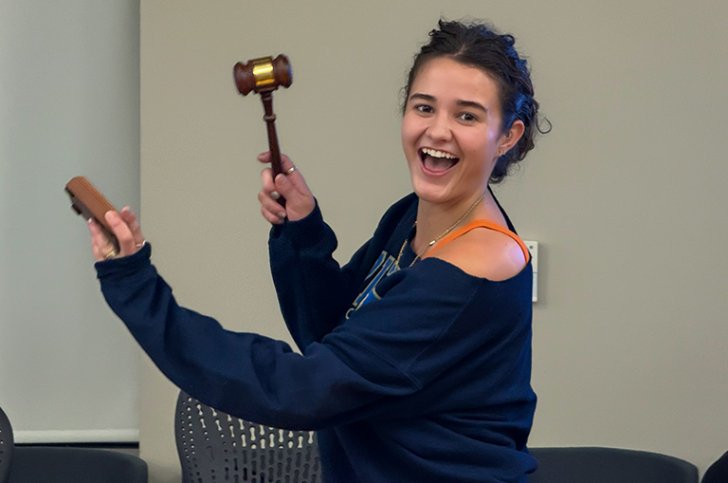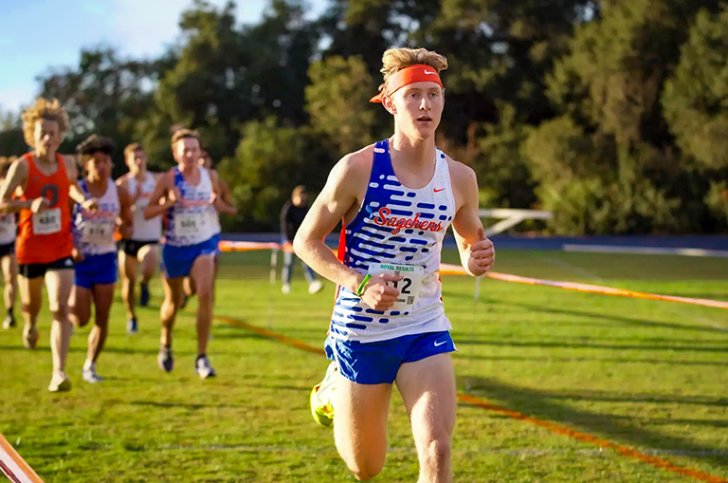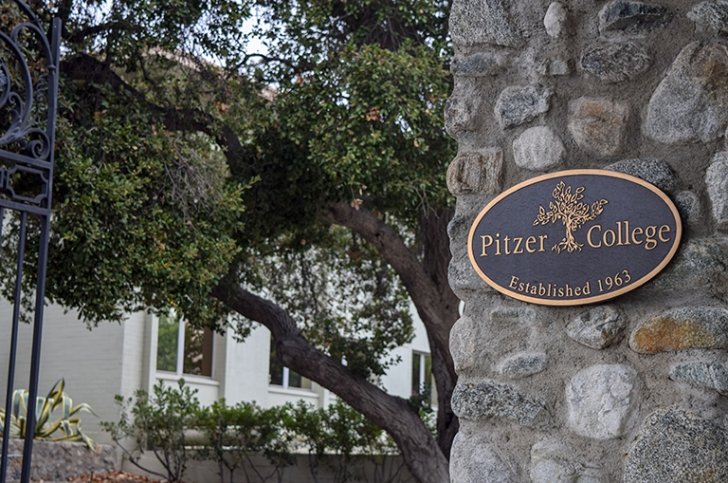Engaging Communities Through Mentorship and Economics
Two Pitzer students draw from their economics major and peer mentorship to make the corporate and college worlds more accessible.

Aru Warrier ’25 and Sam McGinty ’25 are bringing high-rise corporate buildings to the ground level. As economics majors, they often break down complex, real-world problems so that everyone can understand. They have applied this principle to a peer mentorship program to give fellow students college and career advice.
Warrier and McGinty founded the Center of Advancement for Students in Economics (CASE) last year. Inspiration for the Pitzer club came from when Warrier looked for tailored career guidance as an international student from Singapore. While she appreciated the Career Services staff, she also wanted to connect with upper-level students.
“Peer to peer, it’s a little easier to ask unfiltered questions with people who have just gone through the same experience,” said Warrier.
McGinty recalled how an informal conversation with an older student in his first year guided his career. That student later supported McGinty on the path to becoming a management consulting analyst at Accenture, a leading global professional services company, after he graduates this spring. McGinty wanted to create a similar opportunity for others.
“Upperclassmen are the most in touch with the recruiting process. They know the newest and freshest advice for students,” he said. “The value of speaking with other students is unmatched.”
Guiding the next generation of students
CASE has expanded to include other majors—welcoming students interested in pre-law, environmental analysis, research, consulting, banking, and more. Warrier and McGinty have adapted the club according to their diverse members’ needs.
CASE started with hosting speakers and office hours, until students asked for more personalized attention. Warrier and McGinty invited upper-level students to become mentors and matched them with new students based on shared backgrounds or passions. Mentees don’t need pre-qualifications in their resume to receive mentorship.

Some mentees want help choosing majors or registering for classes, while others hope to learn about post-grad opportunities. The mentors also act as a bridge between students and Career Services, Student Affairs, and other campus resources.
“What’s holding students back is not knowing how to start,” said McGinty. “We can be that foundation for them to take their first stride.”
Building leadership experience
Running the club and mentoring other students has helped Warrier and McGinty to strengthen their leadership, communication, and flexibility toward others.
“The biggest benefit in my personal growth is diversity of perspective,” said Warrier. “A useful skill in any career is being malleable and adaptive to the person you’re talking to. Liberal arts are great for their small-class interactive style. When you have a sustained one-on-one relationship, you get better at navigating interpersonal dynamics.”
CASE focuses on the corporate and pre-professional sphere. Warrier and McGinty hope to add programming and mentors for a wider breadth of interests. Meanwhile, the spring promises new growth for CASE. Warrier and McGinty are concurrently leading the club with Isa Iqbal ’26, who will take over after they graduate. They also plan to build more speaker and workshop series and collaborations with campus partners.
CASE recently hosted an event for economics faculty to present about the major and join a mixer with students. Warrier facilitated the event as the student-faculty liaison for Pitzer’s economics field group. She hopes that CASE can work with other field groups and alumni as the club grows.
Economics makes the world go round
Even as CASE extends its mission beyond economics, the field remains a driving force for the club’s co-founders.
“Everything can be connected to economics,” said Warrier. “Decision making involves an opportunity cost, which is inherently economic.”
McGinty agreed: “Every time we decide to do something, we’re forfeiting the opportunity to do something else—a reminder that economics is a part of our lives even when we don’t realize it.”
Economics uses qualitative and quantitative data as a framework to approach everyday problems. This thought process has guided Warrier and McGinty to evolve CASE as students’ aspirations have evolved. They relied on the club’s membership demographics while also analyzing student behavior, preferences, and experiences to guide their programs for the best outcomes.
“I chose economics at Pitzer because of the interdisciplinary aspect,” said Warrier. “More than economics being a major, class, or career path, it’s a way of thinking.”
Through courses ranging from Economics of Immigration to Urban Economics, students can look at economics through labor, history, neuroscience, environmentalism, and social issues.
“We’re not looking at economics solely through the lens of business but rather how economics is prevalent in all parts of our lives,” said Warrier.
McGinty appreciates how the economics coursework integrates Pitzer’s core values. He said that a corporate finance class at another institution might focus solely on traditional financial practices, but Pitzer’s version studies the topic through a lens of environmental sustainability, incorporating green applications.
“That’s part of the reason I came to Pitzer,” said McGinty. “I wanted to be at a place that felt like what I was learning was going to be applicable to bettering the communities and environments around me.”
Starting careers in finance and consulting
Warrier and McGinty’s journey to better the world through economics is just beginning.
Warrier, who is also a political studies minor, is pursuing wealth management at Goldman Sachs after graduation. She was inspired by her internship experience working with diverse clientele on various goals—from supporting the next generation of their families to starting a non-profit. She is excited about how these one-on-one relationships can make a long-term impact in the financial sector.
McGinty is taking his undergraduate experience with the student-run Pomona Consulting Group and Product Space to his upcoming job in consulting. He loves how the field challenges him to think outside the box while working on diverse projects across various industries.
“I think of consulting as the liberal arts of careers,” said McGinty. “It incorporates many disciplines while helping you develop a versatile skill set.”
According to Warrier, the economics major has prepared them well for ambiguity and nuance. She learned early on that no economics model is a perfect representation of the world.
“Any theory technically is inherently flawed,” said Warrier. “You go in without having that strong vindication that matters can be black and white. Economics teaches you how to be a critical and analytical thinker.”
News Information
Published
Author
Bridgette Ramirez


